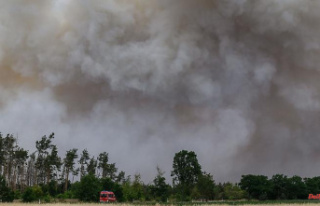“The global economy, still reeling from the pandemic and the Russian invasion of Ukraine, faces an increasingly bleak and uncertain outlook,” observes the International Monetary Fund’s chief economist, Pierre -Olivier Gourinchas, in a blog post.
“Many risks” mentioned by the IMF in its latest forecasts in April “have started to materialize”, he warns, and “the world could soon find itself on the verge of a global recession, only two years after the last".
Global growth is now only expected at 3.2% in 2022, or 0.4 points less than anticipated in April, reflecting "the slowdown in growth in the three largest economies in the world - the States United States, China and the Eurozone - with important implications for the global outlook," Gourinchas said.
The growth forecast for the United States for this year is lowered by 1.4 points compared to April, to 2.3%.
And the likelihood of the world's largest economy escaping recession is now low, Mr Gourinchas warned at a press conference: "The current environment suggests that the possibility of the United States escaping recession is slim. indeed (...) It is a very narrow path".
- "Planting the seeds of stability" -
China recorded "a slowdown worse than expected", with 3.3% projected growth (-1.1 points) due to closures linked to Covid-19 and "the worsening of the real estate crisis" .
As for the euro zone, the growth forecast has been lowered by 0.2 points, to 2.6%, weighed down by Germany, France and Spain, as a result, among other things, of the war in Ukraine.
Russia, on the other hand, which is facing a wave of international sanctions, should come out better than expected in 2022, registering a plunge in its GDP of 6%, not 8.5% as expected three months ago. , which remains "a very severe recession", commented the chief economist.
It's a bleak picture described by the IMF in its report.
Prices keep going up all over the world. Inflation is expected to reach 8.3% this year globally (0.9 points compared to the April forecast). The war in Ukraine has caused food and energy costs to soar, weighing particularly heavily on the poorest populations.
Faced with this, central banks, including the Fed in the United States and the ECB in Europe, have begun to turn off the liquidity tap to restrict consumption and ease the pressure on prices.
And they must continue, "because it is necessary to plant the seeds of future macroeconomic stability", commented Pierre-Olivier Gourinchas.
But this will not be without difficulty: "a tighter monetary policy will inevitably have economic costs, but any delay will only exacerbate them".
To protect the most vulnerable populations, "targeted budgetary support (from governments) can help cushion the impact", but must not increase public debt, as interest rates have increased, warns the institution of Bretton Woods.
- Numerous risks -
For 2023, the global forecast is even more degraded, losing 0.7 points, to fall to 2.9%, due in particular to the consequences of the fight against inflation.
And the reality could turn out to be even worse, as the risks weighing on the economy are numerous.
The war in Ukraine could drive energy prices higher, and "a complete halt in Russian gas exports to European economies in 2022 would significantly increase inflation around the world."
The fight against inflation could turn out to be “more costly than expected”, underlines the IMF, noting that “the risk of recession is particularly important in 2023”.
And the tightening of financial conditions, by driving up interest rates, could cause situations of over-indebtedness in emerging and developing countries.
Global growth, which had fallen by 3.1% in 2020 under the effect of Covid-19, had rebounded by 6.1% in 2021.












